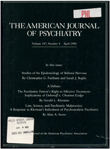Conceptual and methodological issues in comparative studies of psychotherapy and pharmacotherapy, I: Active ingredients and mechanisms of change
Abstract
There has recently been an increased focus on comparing the effectiveness of drugs and psychotherapy in the treatment of mental disorders. The marked differences between these two treatment forms raise many conceptual and methodological problems for the investigator. In a two-part series, the authors discuss a number of these conceptual issues and their implications for research design, implementation, and interpretation of findings. Part I focuses on differences in the active ingredients and hypothesized mechanisms of change of psychotherapy and pharmacotherapy. Issues addressed include the need for standardization of treatments, adequate delivery of treatments, and controlling for factors other than the active ingredients of each treatment.
Access content
To read the fulltext, please use one of the options below to sign in or purchase access.- Personal login
- Institutional Login
- Sign in via OpenAthens
- Register for access
-
Please login/register if you wish to pair your device and check access availability.
Not a subscriber?
PsychiatryOnline subscription options offer access to the DSM-5 library, books, journals, CME, and patient resources. This all-in-one virtual library provides psychiatrists and mental health professionals with key resources for diagnosis, treatment, research, and professional development.
Need more help? PsychiatryOnline Customer Service may be reached by emailing [email protected] or by calling 800-368-5777 (in the U.S.) or 703-907-7322 (outside the U.S.).



